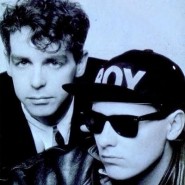Pet Shop Boys歌手简介:
八十年代微型电子音乐合成器的出现,使更多音乐人容易实现其表演或出版唱片的梦想。成立于1981年的“宠物店男孩”(Pet Shop Boys) 可算得上是八十年代最后一支也是最成功的电子音乐组合。Pet Shop Boys是一对天才的词曲合作者:尼尔·泰纳(Neil.Tennant)和克里斯·洛(Chris.Lowe), 他们在出道15年中凭藉轻松快优美的旋律和流畅自然的曲风,赢得了众多乐迷的喜爱。
1954年,NEIL出生于NORTHSHIELDS的一个与音乐毫无关系的家庭, 父亲在一家瑞典橡胶厂工作。在家中,他老二,上有一个姐姐SUSAN,下有两个弟弟SIMON和PHILLIP。NEIL的创造力很早就为家人所知。 当他九岁时,他就感觉这九年似乎白白荒废过去了,没有一点成绩值得骄傲,于是他打算开始写歌。之后,他就与好友PATRICIA写了第一首歌THE GIRL WHO PULLED TAILS,不过这些事在当时并没有引起别人的注意。完成中学学业后,NEIL打算去上大学学习历史和考古,但是多变的性格很快就使他改变了主意, 想去学通信。然而他却遭到学校的拒绝, 原因是面试的那天睡过了头。不过幸运的是,他却意外地被批准去北伦敦理工学校学历史,在那儿,NEIL一直呆到1975年。尽管他曾一度想在英帝国和英联邦历史上继续深造,但在毕业时,他还是在一家英国版的美国杂志MARVEL COMICS里找到了份编辑的工作。
几年后,NEIL去了一家出版社,工作中,他逐渐接触到了那个“肮脏”的流行音乐世界,在NEIL看来,那倒是一个很容易赚钱的行当。后来,NEIL成了英国著名音乐杂志SMASH HITS的自由撰稿人。到这,一个流行音乐化的NEIL开始成型了。 他开始写歌,并把这些歌唱给朋友听。当电子合成器在80年代初为不少流行乐队所接受时,NEIL的音乐也开始电子化了。有一天,正当NEIL在伦敦KING大街上的一家电器行看电器时,一个不经意的搭讪使他结识了一个在他看起来有点疯的CHRIS LOWE,从此就有了宠物店男孩的故事。
CHRIS生于1959年10月4日,是家中最小的一个孩子,上有两个哥哥、一个姐姐。小的时候,他喜欢玩哥哥的玩具汽车、玩具火车,或在周末出去滑冰。CHRIS最大的爱好是建筑,今天依旧。音乐作为他的第二个爱好则显得有些姗姗来迟,但依然占据了他大量的时间,他的钢琴和长号都不错。可是,流行音乐却偏偏不是他的最爱。当他13岁时,他喜欢起了甲壳虫乐队和黛安娜.罗丝,但另他不解的是,为什麽他的朋友都喜欢ALICE COOPER。然而,当DISCO那跳动的节拍向他走来时,CHRIS接受了。在一段时间里,CHRIS曾参加了一个叫ONE UNDER THE EIGHT的乐队,弹奏些老歌。他有许多工作,如当送圣诞礼物的邮递员,在餐馆里洗盘子,做会计、销售经理,不过他最满意的还是在一家DISCO舞厅里当服务员。即便如此,CHRIS也没有把所有精力投入到音乐和跳舞中去的想法,他还是想当一个建筑师,所以后来他进了利物浦大学学习建筑。在上学之中,1981年,他得到了一次去伦敦实习的机会。虽然最终他也只设计了一个楼梯,但他却在一次逛街时遇到了一个叫NEIL的家伙。
1985年,PSB聘Stephan Hague为唱片监制,以一曲《West End Girls》闯入法国和比利时的单曲排列榜,结束了两年的守望期,一跃成为流行乐坛的新宠儿。 接着PSB又推出了《Love Comes Quickly》《Sabarbia》等好作品。1986年,PSB以《West End Girls》连获英、美排行榜的第一位;发行了首张专辑《Please》,突出自己将Disco和Pop揉合的独特风格,以重复迭宕的和声体现忧欢相随的情感。1987年,PSB又推出了第二张专辑《Actually》,内容更加丰厚,二重和声运用更为成熟,而单曲《Its A Sin》《It Couldnt Happen Here》 也在流行榜上取得了骄人成绩。 1988年,他们又发行了一张更为古怪精美的专辑《Introspeetive》, 它熔合多元化的音乐风格,使PSB的顽皮形象推向了极至。其中,《What Have I Done To Deserve This?》充满了消极玩世的态度;而另一首《I Want A Dog》则以一阵沸沸扬扬的狗吠拉开序幕,极尽幽默顽皮之能事。1990年PSB的第四张专辑《Behaviour》是与Harold Fateneyer的合作成果,其中减少了民谣的味道,而以更现实更理性的方式表达强烈的个人理念。到93年《Very》的推出又一次超越了PSB 先前的成绩, 充分显示了他们作为流行音乐前沿斗士和舞曲情感缔造者的实力。1995年底,PSB又发行了一张B面歌曲精选集双C《Alternative》,专辑纵跨他们从艺十年的经典作品,展现了流行舞曲的深度。
PSB的这对英国流行乐坛双璧以其实力屹立乐坛十年之久,确是瞬息万变的乐界的难得之例。 随着时间的推移,他们的音乐将会更具魅力。
by Jason Ankeny
Postmodern ironists cloaked behind a veil of buoyantly melodic and lushly romantic synth pop confections, the Pet Shop Boys cheeky, smart, and utterly danceable music established them among the most commercially and critically successful groups of their era. Always remaining one step ahead of their contemporaries, the British duo navigated the constantly shifting landscape of modern dance-pop with rare grace and intelligence, moving easily from disco to house to techno with their own distinctive image remaining completely intact. Satiric and irreverent — yet somehow strangely affecting — the Pet Shop Boys transcended the seeming disposability of their craft, offering wry and thoughtful cultural commentary communicated by the Morse code of au courant synth washes and drum-machine rhythms.
Pet Shop Boys formed in London in August 1981 when vocalist Neil Tennant (a former editor at Marvel Comics who later gained some notoriety as a journalist for Smash Hits magazine) first met keyboardist Chris Lowe (a onetime architecture student) at an electronics shop. Discovering a shared passion for dance music and synthesizers, they immediately decided to start a band. Dubbing themselves the Pet Shop Boys in honor of friends who worked in such an establishment — while also obliquely nodding to the sort of names prevalent among the New York City hip-hop culture of the early 1980s — the duos career first took flight in 1983, when Tennant met producer Bobby O Orlando while on a writing assignment. Orlando produced their first single, 1984s West End Girls. The song was a minor hit in the U.S. but went nowhere in Britain, and its follow-up, One More Chance, was also unsuccessful.
Upon signing to EMI, the Pet Shop Boys issued 1985s biting Opportunities (Lets Make Lots of Money). When it too failed to attract attention, the duos future appeared grim, but they then released an evocative new Stephen Hague production of West End Girls, which became an international chart-topper. Its massive success propelled the Pet Shop Boys 1986 debut LP Please into the Top Ten, and when Opportunities was subsequently reissued, it too became a hit. Disco, a collection of dance remixes, was quickly rushed into stores, and in 1987 the duo resurfaced with the superb Actually, which launched three more Top Ten smashes — Its a Sin, a lovely cover of the perennial Always on My Mind, and What Have I Done to Deserve This?, a duet between Tennant and the great Dusty Springfield. A documentary film titled It Couldnt Happen Here was released the following year.
Also in 1988, Pet Shop Boys issued their third studio LP, the eclectic Introspective. The single Domino Dancing was their final Top 40 hit in the U.S. The following year, the duo collaborated with a variety of performers, most notably Liza Minnelli, for whom they produced the 1989 LP Results. They also produced material for Springfield, and Tennant joined New Order frontman Bernard Sumner and ex-Smiths guitarist Johnny Marr in the group Electronic, scoring a hit with the single Getting Away with It. The Pet Shop Boys reconvened in 1990 for the muted, downcast Behavior, produced by Harold Faltermeyer. 1991 saw the release of their hit medley of U2s Where the Streets Have No Name and Frankie Vallis Cant Take My Eyes Off You, and was followed in 1993 by Very, lauded among the duos finest efforts to date.
After a three-year absence, the Pet Shop Boys resurfaced with Bilingual, a fluid expansion into Latin rhythms. Nightlife followed in 1999 and sparked the dance club hit New York City Boy. On the success of that, they also toured the U.S. for the first time in eight years. While on tour, Tennant and Lowe were also collaborating with playwright Jonathan Harvey. Since 1997, the three had been crafting a musical surrounding gay life and societal criticisms. Closer to Heaven made its West End debut in 2001 and had a successful run for most of the year. The Pet Shop Boys score of the original cast recording was also a hit in the U.K. They still had time to make a record for themselves, too — in April 2002, Tennant and Lowe issued Release. Disco 3 was compiled for release the following year. In 2005, they put together a volume of the Back to Mine series and released their soundtrack designed to accompany the 1925 silent film Battleship Potemkin, a soundtrack theyd performed a year earlier at a free concert/screening in Trafalgar Square. A year later they issued Fundamental, a mature, sometimes political album produced by Trevor Horn. The live album Concrete: In Concert at the Mermaid Theatre appeared at the end of the year.

